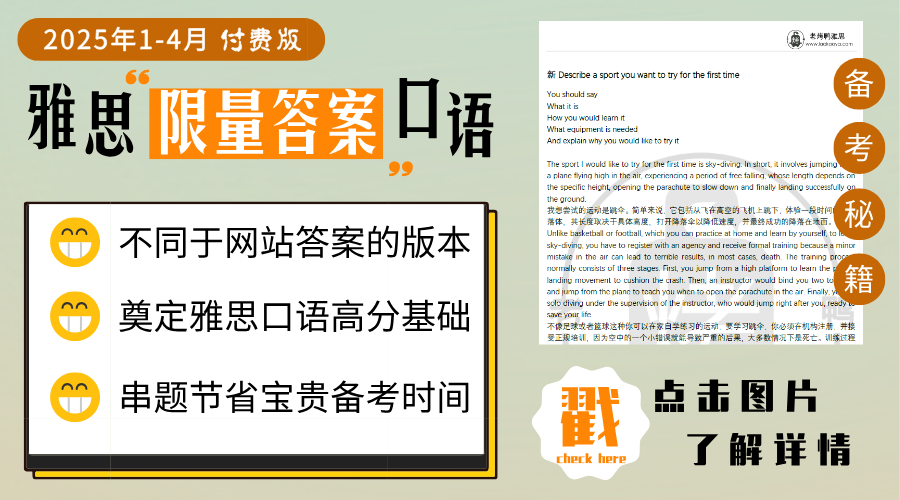剑桥雅思18Test2Passage2阅读答案解析 Living with artificial intelligence 与人工智能共存
剑桥雅思18阅读第二套题目第二篇文章由6道单项选择,4道YES/NO/NOT GIVEN判断,和3道选词填空组成。本来这篇文章就比较抽象,而选择和判断又都需要对文章内容有一定的理解,因此整体难度较大。哪怕大家做的不好也不用伤心。下面是具体每道题目的答案解析。
剑桥雅思18Test2Passage2阅读原文翻译 Living with artificial intelligence 与人工智能共存
剑桥雅思18 Test2 Passage2阅读答案解析
老烤鸭雅思原创解析,请勿抄袭转载
第14题答案:C
对应原文:第1段:But many experts believe this restriction is very temporary.
答案解析:原文第1段提到,许多专家认为,AI存在的限制很快会被突破。选项C中future对应temporary,limitations对应restriction,由此确定其为正确答案。A选项错在it is difficult to predict(原文中有by mid-century),B选项的much can be learned和D选项的Experts disagree都属于无中生有,因此统统排除。
第15题答案:A
对应原文:第2段:Machines will be free of many of the physical constraints on human intelligence.
答案解析:作者在原文第2段第2句提到,机器会摆脱人类智能所存在的许多物理限制。最后1句又说到我们目前的大脑与思维物理极限的差距。即不存在这些限制的机器很有可能超越人类,由此确定A选项为正确答案。选项B, C, D在原文中几乎都没有提及,因此统统排除。
第16题答案:B
对应原文:第3段:… the more important it will be to specify its goals with great care. Folklore is full of tales of people who ask for the wrong thing, with disastrous consequences – King Midas
答案解析:根据行文规律,某个例子所说明的道理往往会在前文指出。往前寻找发现,作者特别强调明确AI目标的重要性,由此确定B为正确答案。
第17题答案:D
对应原文:第4段:If superintelligent machines don’t do a lot better than us, we’ll be in deep trouble.
答案解析:作者在4段指出,我们人类其实对自己不太友好,给同胞和其他生物带来了无数灾难。因此未来的AI必须比我们强才行。这也是目前存在的一大困难。选项中只有D的意思与此相符,由此判断其为正确答案。
第18题答案:C
对应原文:第5段:Luckily they’ll be smart enough for the job. If there are routes to the moral high ground, they’ll be better than us at finding them
答案解析:原文第5段提到,AI比人类更聪明,如果存在道德高地的话,它们会比我们更容易找到。即机器在某一方面比人类更强,由此确定C为正确答案。
第19题答案:D
对应原文:第6段:This won’t be easy, given that we are tribal creatures and conflicted about the ideals ourselves.
答案解析:原文第6段提到,开启这一任务的困难之一在于,我们人类对于理想状况的认知就存在冲突。即人类的缺陷会使的制造我们所需要的机器更为困难,由此确定D为正确答案。A选项abuses of power, B选项share very few features,C选项a limited number of people都属于无中生有,因此统统排除。
第20题答案:YES
对应原文:第7段:by putting ourselves in the hands of these moral guides and gatekeepers, this article is from laokaoya website, We might lose our freedom to discriminate in favour of our own communities, for example.
答案解析:原文第7段提到,有了AI监管,我们可能会失去优待我们自己社群的自由。题干中manchines with the ability to make moral decisions对应moral guides and gatekeepers,prevent us对应lose our freedom,promoting the interests对应discriminate in favour of,our communities则是原词。即题目中的所有主要信息点在原文中都能找到对应,因此判断单位YES。
第21题答案:NOT GIVEN
对应原文:第8段:But are we ready for ethical silicon police limiting our options?
答案解析:根据silicon police定位到第8段的这句话。但原文中并没有任何词句提到有关机器警察的数量问题。题干中in large numbers的说法属于无中生有,因此判断答案为NOT GIVEN。
第22题答案:NO
对应原文:第8段:but few of us are likely to welcome such a future.
答案解析:在第8段的最后,作者表示,可能很少有人会欢迎这样一种未来(即人类丧失一定的自由,由机器进行监管)。题干中many people的说法与few of us冲突,因此判断答案为NO。
第23题答案:YES
对应原文:第10段:For our own safety, we need to point these new thinkers in the right direction, and get them to act well for us. It is not yet clear whether this is possible, but if it is, it will require a cooperative spirit, and a willingness to set aside self-interest.
答案解析:这道题无论是定位还是判断的难度都比较大。题干中act in our best interests可以对应for our own safety, right direction, 以及act well for us,而work together则可以对应cooperative spirit, a willingness to set aside self-interest,由此判断答案为YES。
第24题答案:C
对应原文:第9段:AI already has some input into how resources are used in our National Health Service (NHS)here in the UK
答案解析:根据标题定位到第9段,题干中has a limited role对应has some input,way对应how,are allocated对应are used,由句子结构和修饰关系,锁定resources,确定答案为C。
第25题答案:A
对应原文:第9段:However, we’d be depriving some humans (e.g. senior doctors) of the control they presently enjoy
答案解析:顺着上一题往下,根据however定位到第9段这句话。从题干their可以推测出空上应该填某种人,由此锁定senior doctors,确定A选项为正确答案。
第26题答案:E
对应原文:第9段:However, we’d be depriving some humans (e.g. senior doctors) of the control they presently enjoy
答案解析:题干中not having与depriving同义替换,根据修饰关系锁定control。选项中只有E可以与其对应,因此确定它为正确答案。
剑桥雅思18Test2Passage1阅读答案解析 Stonehenge 巨石阵
剑桥雅思18Test2Passage3阅读答案解析 An ideal city 理想城市


